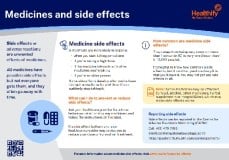You can now add Healthify as a preferred source on Google. Click here to see us when you search Google.
Immune checkpoint inhibitors
Key points about immune checkpoint inhibitors
- Immune checkpoint inhibitors are medicines that use the body's immune system to treat some types of cancers.
- They belong to a group of medicines called immunotherapy.
- Find out how they are given and possible side effects.

Immune checkpoint inhibitors use the body's immune system to treat some types of cancer. They belong to a group of medicines called immunotherapy. Examples of immune checkpoint inhibitors available in New Zealand are:
- atezolizumab (also called Tecentriq)
- durvalumab (also called Imfinzi)
- ipilimumab (also called Yervoy)
- nivolumab (also called Opdivo)
- pembrolizumab (also called Keytruda).
Immune checkpoint inhibitors are given as a drip (infusion) through a needle or catheter, usually intravenously (IV).
In Aotearoa New Zealand these medicines are funded for certain cancers only if you meet certain criteria. This is called a Special Authority. It means your specialist will need to apply to Pharmac (the government agency that funds medicines) for approval before the medicine can be funded for you.
No, all immune checkpoint inhibitors aren't the same. They can differ in their action because they block different checkpoint proteins and are used in different ways.
The main checkpoint proteins are programmed death-1 (PD-1) and its ligand (PD-L1), and cytotoxic T-lymphocyte antigen-4 (CTLA-4).
PD-1 inhibitors
- Nivolumab (Opdivo)
- Pembrolizumab (Keytruda)
PD-L1 inhibitors
- Atezolizumab (Tecentriq)
- Durvalumab (Imfinzi)
CTLA-4 inhibitors
- Ipilimumab (Yervoy)
Certain immune checkpoint inhibitors are approved for specific cancers because clinical trials showed they work well for those cancers. The type of treatment that your specialist chooses for you depends on:
- what type of cancer you have
- how far it has spread
- your general health.
Your oncology (cancer specialist) team will keep a close eye on you during your treatment. You may have blood tests, X-rays and scans to see how you're doing. If necessary, your oncology team will change your medicines, the dose or how often they give them to you. Sometimes they will stop the treatment early or recommend you keep taking it for longer than planned. It all depends on how your body and the cancer respond to the treatment.
The immune system helps to protect your body from viruses and bacteria and also helps your body recognise tumour cells.
- Immune checkpoints are proteins that naturally occur in your body and assist with the immune response.
- These checkpoints prevent your immune system from attacking healthy cells by mistake.
- However, some cancer cells can alter these checkpoints so they're not recognised by the immune system.
- Immune checkpoint inhibitors are medicines that work by blocking these checkpoints, so the immune system can attack cancer cells.
You can see how immune checkpoint inhibitors work in this video.
(National Cancer Institute, US, 2018)
No, immune checkpoint inhibitors (also called immunotherapy) and chemotherapy are not the same. They work in different ways to treat cancer.
- Chemotherapy attacks cells as they divide and can kill both cancerous and healthy cells in the process. This makes it a cytotoxic treatment.
- Immune checkpoint inhibitors don't directly kill cells. Instead, they work by helping the immune system recognise and attack cancer cells.
Like all treatments, immune checkpoint inhibitors (ICIs) can cause side effects and these medicines can cause immune-related adverse events. This is because they affect the immune system by triggering an immune response, which can cause side effects from inflammation (swelling) anywhere in the body. Side effects are a sign that the treatment is affecting your immune system in some way, but this may or may not mean the treatment is affecting the cancer.
- The chances of getting these side effects differs between the different ICIs.
- Before starting treatment with an ICI your healthcare team will talk to you about possible side effects.
- Most people have mild side effects. Side effects are likely to be more severe if you're having higher doses or a combination of ICI medicines, or if you're having them with other cancer treatments.
- Side effects can happen at any time during your treatment or even months after treatment has finished. Some side effects go away within a few days or weeks and some may be longer lasting.
It's important to report any side effects to your healthcare team straight away, even if they appear mild. Don't manage these side effects on your own. If you experience any symptoms, feel unwell or notice any changes, contact your healthcare team.
Why do I need to report side effects straight away?
Side effects can be better managed if reported early. It’s important to let your healthcare team know about new or worsening symptoms, even if they seem minor or you’re not sure if they're related to your treatment. If left untreated, side effects can become serious and may even be life-threatening. Sometimes it can be tricky to know whether your symptoms are related to the cancer or the treatment. When in doubt, reach out to your healthcare team.
Some side effects can happen after you stop treatment
If you become unwell, even years later, it is important to tell any healthcare providers you see that you have had immunotherapy. Some healthcare providers may not be familiar with the side effects of these medicines. Your cancer team may give you a card with information about your treatment and potential side effects. You can show this card to other healthcare providers you see and ask them to consult with your cancer team.
For more information, see side effects of immune checkpoint inhibitors.
The following links have more information about lung cancer:
Lung cancer(external link) Cancer Society NZ
Lung cancer patient toolkit(external link) Lung Foundation NZ
These resources might be useful in tracking your symptoms and side effects:
Te Kete Haerenga and fatigue
Te Kete Haerenga and sleep
Te Kete Haerenga and pain
Te Kete Haerenga – tools and diaries
Symptom tracker(external link)
Brochures
Chemotherapy, Immunotherapy and Targeted Treatment(external link) Cancer Society, NZ, 2019
Medicines and side effects [PDF, 91 KB] Healthify He Puna Waiora, NZ, 2024
5 questions to ask about your medications(external link) Health Quality and Safety Commission, NZ, 2019 English(external link), te reo Māori(external link)
References
- Immune checkpoint inhibitors – primary care considerations(external link) He Ako Hiringa, NZ
- Autoimmune complications of immunotherapy(external link) Medsafe, NZ
- Pharmac funds two new treatments for lung cancer(external link) Pharmac, NZ
- Decision to fund two new treatments for people with advanced non-small cell lung cancer(external link) Pharmac, NZ
- Immune checkpoint inhibitors(external link) Goodfellow Unit, NZ
- Immune checkpoint inhibitors – a new cancer treatment(external link) BPAC, NZ
Brochures

Chemotherapy, Immunotherapy and Targeted Treatment
Cancer Society, NZ, 2019

Medicines and side effects
Healthify He Puna Waiora, NZ, 2024

Health Quality and Safety Commission, NZ, 2019 English, te reo Māori
Credits: Healthify editorial team. Healthify is brought to you by Health Navigator Charitable Trust.
Reviewed by: Healthify clinical advisors
Last reviewed:
Page last updated:





